3.4 Verletzungen

Lektionsüberblick
This lesson will focus on talking about injuries (in the past, since we generally don’t talk about an injury as it is happening) and where you can buy medical supplies and medication. In the end, you will be able to 1) talk about injuries and their typical treatments and 2) differentiate between an Apotheke and Drogerie.
1) Verletzungen
In this final section, we will look at the language around some common injuries. Let’s start with an introduction to such injuries.
Now let’s practice!
It’s time to look at the language in context.
|
|
|
Jetzt bist du dran!
Hast du dich schon mal verletzt? Answer the question in your written journal about an injury you have had, using the modeled language from the previous activities.
Then record your answer in your audio journal.
Deutsch IRL
These related texts, videos, and podcasts were made for German learners. Read, watch, and listen to increase your cultural knowledge on this topic.
- Here is a video “Beim Arzt” about a man who may have a broken foot with listening comprehension questions.
- A series of stories called “Gesundheitssystem – was passiert, wenn man in Deutschland krank wird” with audio and text about a young man who breaks his arm.
- Here is a story being read aloud “Ich bin erleichtert” about a ski accident.
- Video story about a little boy and a broken arm Sendung mit der Maus: Sachgeschichten “Armbruch“.
Genf im Blickpunkt
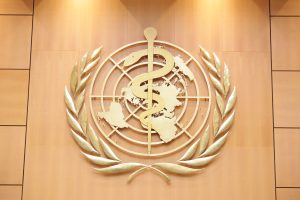
In Genf hat die Weltgesundheitsorganisation (WHO) ihren Hauptsitz. Die WHO wurde 1948 gegründet und arbeitet weltweit für Gesundheit, zum Beispiel mit Impfungen und Medikamenten. Ein Beispiel: Sie leitete die Impfkampagne gegen Pocken. Seit 1980 gelten Pocken offiziell als besiegt.
The World Health Organization (WHO) is headquartered in Geneva. It was founded in 1948. The WHO works to promote health worldwide, for example, through vaccinations and medicines. One example: It led the smallpox vaccination campaign. Smallpox has been officially considered eradicated since 1980.
2) Apotheke oder Drogerie?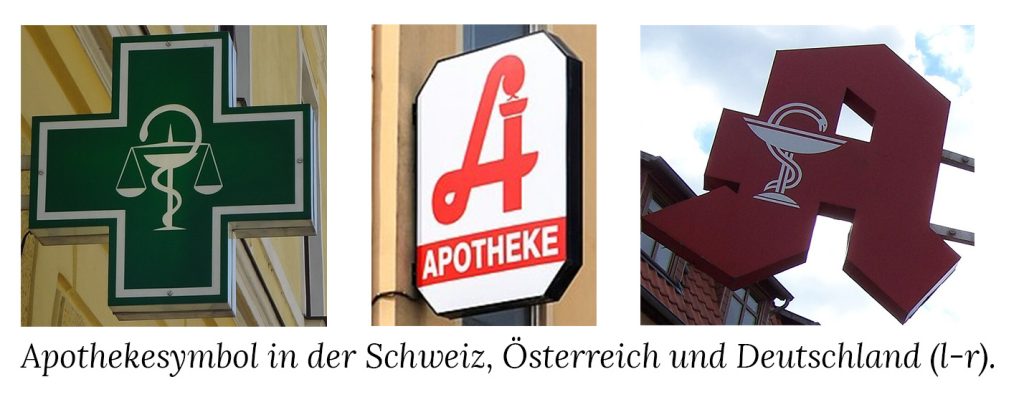
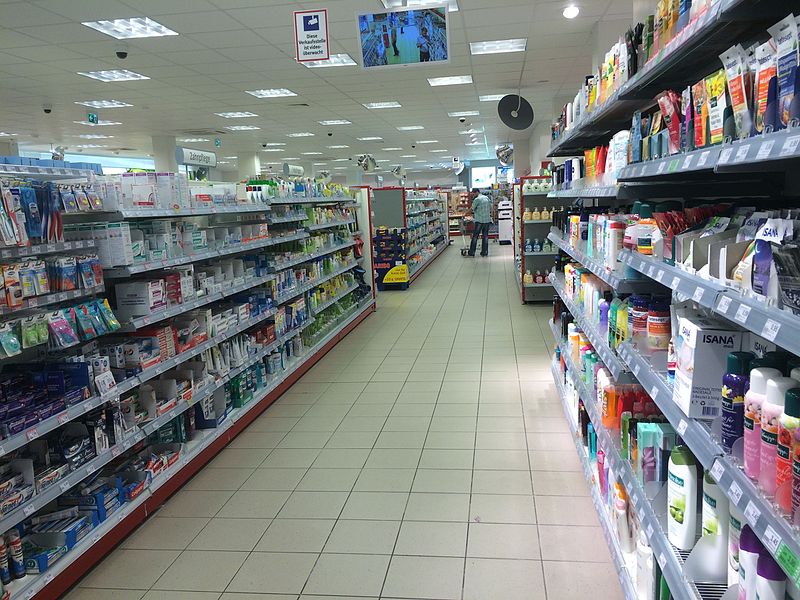
In the USA and Canada, one typically goes to a “drug store” (or even a grocery store) which is often a one-stop shop with many items for personal care that includes a pharmacy where one can fill medical prescriptions and seek medical advice for common ailments.
In German-speaking countries, these two are separated. A Drogerie sells personal care products, first-aid products, vitamins, and perhaps some herb-based remedies, but Drogerien sell a very limited selection of over-the-counter medications, if any at all.
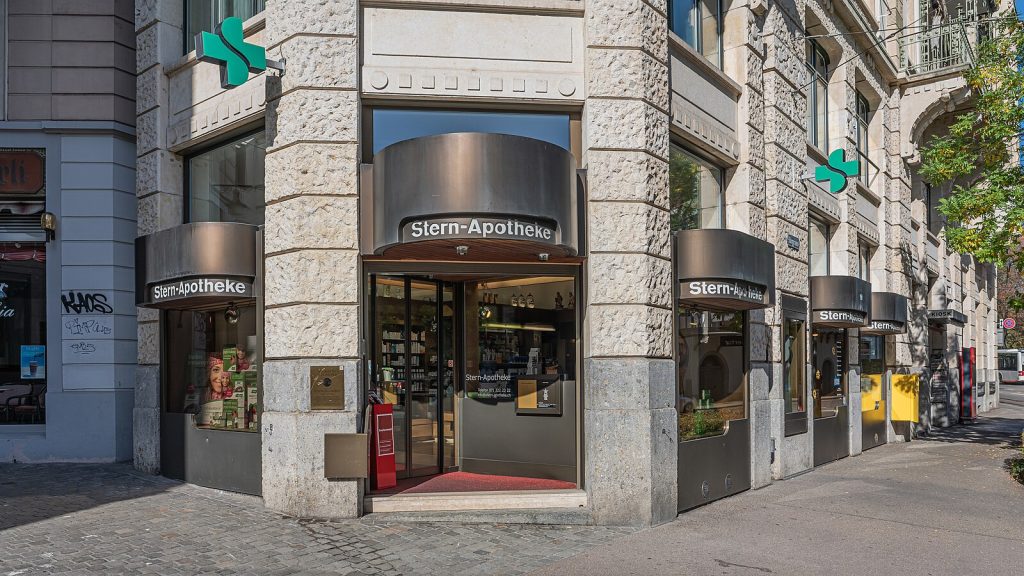
To purchase medicine prescribed by your doctor or over-the-counter medicine, you need to go to an Apotheke and speak with a licensed pharmacist: die Apothekerin/der Apotheker. In an Apotheke, you can pick up prescriptions, purchase over-the-counter medicines, or the pharmacist may recommend and create a non-traditional medicinal option, such as a special tea blend known to help relieve common symptoms.
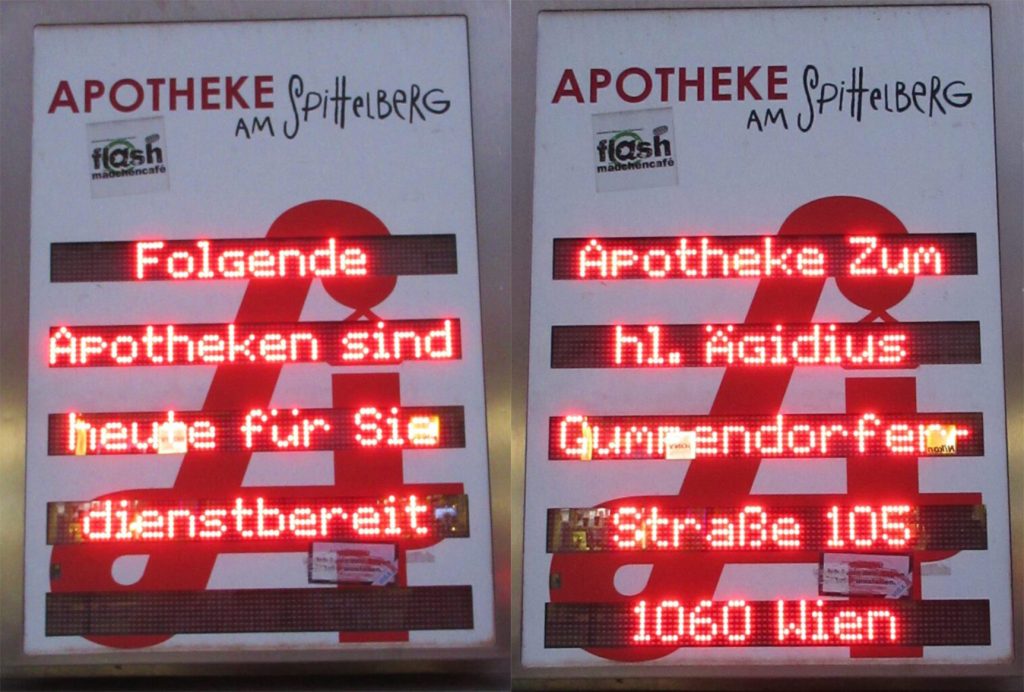 Store operating hours in German-speaking countries are significantly more restricted than they are in the USA and Canada, however there will always be at least one local Apotheke open during the night for medical emergencies. If your local Apotheke is closed, it will have information posted that will tell you where the nearest open Nachtapotheke is located.
Store operating hours in German-speaking countries are significantly more restricted than they are in the USA and Canada, however there will always be at least one local Apotheke open during the night for medical emergencies. If your local Apotheke is closed, it will have information posted that will tell you where the nearest open Nachtapotheke is located.
Let’s learn where we can buy certain personal care items – in a Apotheke or Drogerie.
Now let’s practice!
Want more? Here’s more vocabulary related to the Apotheke.
Jetzt kombinieren!
In this lesson, you learned how to 1) talk about injuries and their typical treatments and 2) differentiate between an Apotheke and Drogerie. Now let’s combine what you have learned.
Erzähl mal von deiner Kindheit! Hast du dir etwas gebrochen oder verstaucht? Add to your origin story by talking about some injuries from your childhood.
When you are done, practice this part of your origin story until it flows like natural conversation. Then record yourself in your audio journal. As always, you are more than welcome to meet with a classmate and do your recordings together!

Media Attributions
- Apothekesymbol photo collage: Logo Pharmacy by Ondrej Janovec (Public Domain license), Graz Wienerstraße by TheRunnerUp (CC BY-SA International License), and Alte Apotheke Waltershausen by Metilsteiner (CC BY-SA International License).
Media Attributions
- 2030-2040 ch banner reduced size
- Photo of WHO logo, Flickr, CC BY-ND 2.0
- 3.3 apothekesymbol schweiz oesterreich deutschland
- 3.3 rossmann Drogerie © Jan Hagelskamp1 is licensed under a CC BY (Attribution) license
- 3.3 StGallen_asv2022-10_Stern-Apotheke_img2 © A.Savin is licensed under a CC BY (Attribution) license
- 3.3 apotheke spittelberg nachapotheke combined © Grenzenlos Deutsch is licensed under a CC BY-NC-SA (Attribution NonCommercial ShareAlike) license

